By Dr. M. Asrarul Haque,
Haj for Muslims from India is an ordeal thanks to the mismanagement of Haj operation. The Haj Committee of India enjoys the lion’s share of the mismanagement – from taking off to taking off. Here is a first-hand account of the ordeal that a common Haji has to undergo. The gross mismanagement smacks of prevalent though hidden corruption—Editor
Lack of Information and Proper Communication
In 2008 I had applied for two seats (for myself and my wife) to perform Hajj that year under the government quota and luckily our applications were approved. I received a phone call from the Hajj Division of MEA informing that we had to complete the formalities. I rushed to the Delhi Hajj Committee office and obtained Application forms. After completing the same and depositing the required amount in the SBI we dispatched our forms to the Hajj Committee of India, Mumbai. We were delighted as our year long desire was going to be fulfilled. But we did not know that we were going to face difficulties after difficulties. After sending the Application Forms I was regularly trying to contact the Hajj Committee of India, Mumbai over the phone on the numbers indicated on the Application Forms. All the numbers given there were totally inaccessible. Either there were ‘engaged’ sounds or the phone went on ringing without any response. I repeatedly requested the Delhi Hajj Committee office to suggest some way out. But they always insisted that the numbers given on the Application Forms were the only numbers known to them. I sent email on the address given on the Application Forms. But there was no response. After great deal of difficulties I could obtain the phone number of CEO, Hajj Committee of India, Mumbai and I could contact him. Only then I could receive Cover Number which was essential for all further activities including statutory Medical Certificate, Vaccination etc. Another difficulty I encountered was that the letter received from Hajj Committee of India, Mumbai had printed our names incomplete. I immediately informed the Hajj Committee of India, Mumbai about the same through letter and email. But necessary corrections were not made. We were only assured that the same would be taken care of while preparing the Passport, Visa etc. On enquiry about the travel details, I was told by the officials of the Hajj Committee, Delhi that I would receive phone call from Mumbai and also details would be available on the website of the Hajj Committee of India, Mumbai
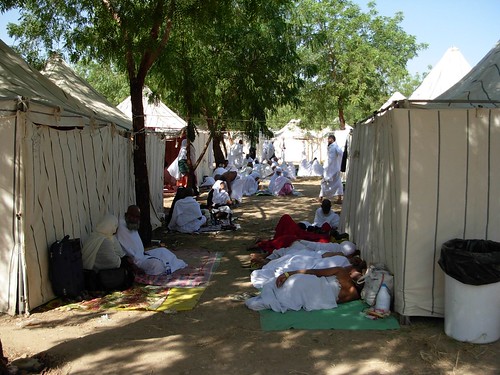
Pilgrims in open sun at Arafat on account of lack of space
I was checking the website of the Hajj Committee of India, Mumbai on daily basis to find out about our travel details. On 12th November 2008 I checked the website at about 5.30 pm. The website indicated that our travel schedule was not final. Later, on the same day, when I checked the website at about 10.30 pm, I was shocked to see that we were supposed to travel to Saudi Arabia on the same date and during the day hours. Surprisingly the information was placed on the website only after 5.30 pm. I tried to contact the Hajj Committee of India in Mumbai telephonically very next morning. But there was no response. Then I went to the Delhi Hajj Committee office. There I came to know that it was a general practice of Hajj Committee of India to place irrelevant information on their website. In the Delhi Hajj Committee office I had to spend hours to contact various officials. Finally our seats were booked for one of the flights leaving Delhi on 16th November at 9.00 am.
It would not be out of place to mention that in the Delhi Hajj Committee office I met several people from outside Delhi who were in Delhi for several days waiting to get their tickets, passports etc. I met one old lady from UP. She was in Delhi with her family for fourteen days waiting for their tickets, passports etc. She told that everyday she was assured that things could be sorted out the next day. In the process she had exhausted all her money on food and other necessities during their stay in Delhi. She was literally crying. But no one was giving her definite information and there was no end to her woes.
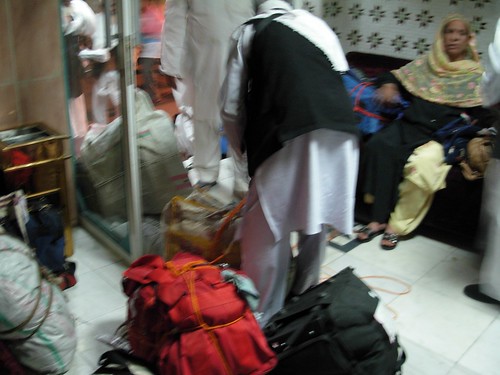
People searching for their luggage on the street in the middle of night
Ticket, Passport etc. Distributed only Previous Night and with Hours of Delay
On asking when I could collect our tickets, passports etc. I was told that the same had to be collected only on 15th Nov. at 10 pm. It was surprising as the next morning we were supposed to be at the airport by 05.00 am. But we were told that the same was the practice of the Hajj Committee of India. Obviously there was no choice. On 15th Nov. I reached the Delhi Hajj Committee office at about 10.00 pm. There I was told that it could take another hour for the documents to be ready. Some Stickers were to arrive from Mumbai through internet to be pasted on the Passports. I could not get the documents till about 12.30 am while we had to board the flight the same morning. Also, I came to know at the time that the flight was prescheduled at 8.00 am in lieu of 9.00 am. So, we had one hour less. Obviously, we were restive. Finally, after lot of persuasion we were given our tickets and passports without the stickers at about 1.30 am. We were advised to get the stickers fixed at the airport. After 2.30 am somehow I could reach my residence. There was no time to take rest. By 4.00 am we had to be at the airport.
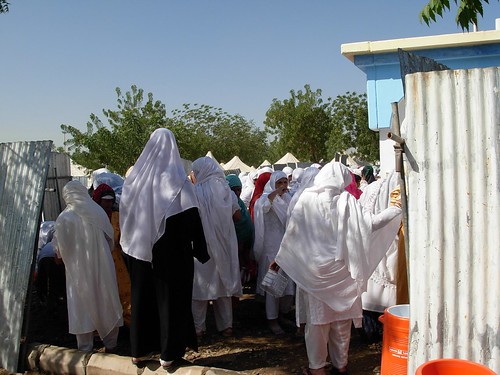
Long queue for use of toilet facilty by women at Arafat. Similar situation was there at Mina
Mismanagement and Torture of Pilgrims at the Port of Destination
Finally, on 16th Nov. 2008 we boarded the flight (No. SV 5119) at about 7.00 am. The flight took off almost in time and we reached Madinah by about 3.00 pm local time. Airport formalities were fast and we could get out of the airport by about 3.45 pm or so. Some officials wearing India logo took us to buses parked outside the airport. We were asked to board the buses and leave our luggage on the pavement. We were told that the luggage was to be taken care of by the officials. An important issue was that all the pilgrims reaching by that flight were not to be accommodated in one building (also called guest house). Obviously, the pilgrims were concerned how their luggage could reach the right building. But the officials assured that they could identify the luggage of various pilgrims through stickers which carried the Cover numbers.
Any way we were forced into the buses and asked to occupy seats. We did so. The doors of the buses were locked by the drivers on the pretext that some pilgrims could stray around otherwise. We were certain that the buses could move in few minutes time as every formality was over. But the buses remained there and we had no way to move out of the buses. Hours passed by and we were kept hostage in the buses without any toilet facilities, drinking water, food etc. People ‘kept hostages in buses’ had to offer their Asr, Maghrib and Ishaa prayers sitting in the buses without ‘wuzoo’. I hope that people in charge knew that wuzoo was essential before offering prayers. There were old people, ladies and even few children in the buses. For them to remain confined for four hours was a real torture and that too without water, food or toilet facilities. Besides causing a disruption to our religious duties, their action also amounted to criminal behaviour.
Mismanagement of Luggage
After about four hours the buses moved and we reached the first guest house. Names were called for the pilgrims who were supposed to stay there. We were included in the list. So, we got down and started looking for our luggage. The luggage was lying scattered on the road outside the guest house. There was total chaos as the luggage was piled over one another. Out of the three pieces of our luggage, only one was there. Two of our suitcases were missing. More or less same was the case with the other pilgrims. When we asked the persons supervising the matter, we were assured that our luggage would be brought in half an hour. He said that most probably those were offloaded at the other guest house. On the other hand large numbers of pieces of luggage were lying unclaimed on the road in front of our guest house. Obviously those belonged to the persons who were taken to the other guest house/s, and their
luggage was offloaded at our guest house.
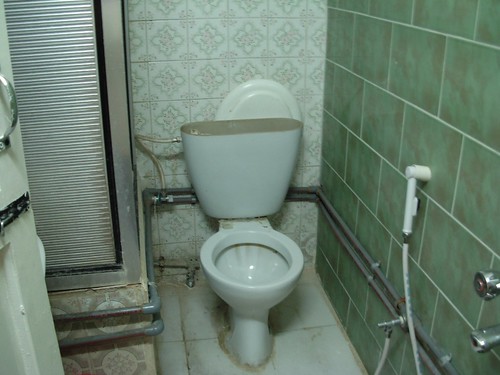
Deplorable condition of toilet in the hotel in Madina
For about two hours our luggage did not arrive. Finally, at about 10.30 pm the responsible persons informed us that the luggage could be transported to our guest house only in the morning as there was no vehicle available. It was not possible for me to leave the luggage like that as essential items including our medicines were in those suitcases. I requested one of the officials to take me to the other guest house. After lot of persuasion he took me to the other guest house which was about one km away. There I found large number of luggage lying unattended on the road while the officials were enjoying their dinner inside. Luckily, I could locate both of my suitcases there. I hired a taxi and brought my luggage to my room by about 11.30 pm.
Inhuman Conditions in the Guest House at Madinah
We were given a small room about 10 ft x 12 ft in which four beds were placed without any other furniture. Accordingly, four persons were allotted the room. The beds were placed so close that there was almost no space for movement between the beds. Only some small space was left in the middle of the room. There was no storage facility in our room so everything had to be stored on the beds or under the beds on the floor. There was an attached bathroom which was equally small. The space on the two sides of the toilet seat was too small to be used comfortably. But we had no choice. In other rooms which were a little larger five or six persons were accommodated. Later, I came to know that the rooms were originally meant for one or two persons. But just to accommodate more Indian pilgrims extra beds were placed. It was quite obvious. Temporary stickers were fixed on the doors indicating the room nos. and the number of persons to be accommodated. For nine days we had to spend our time in that condition. We had to sleep on the bed and also keep our clothes etc. on the bed as the same could not be kept on floor.
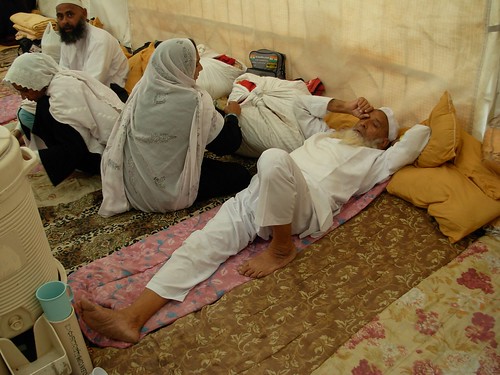
Condition at Mina: Each pilgrim was provided a bed only which was only 6 ft by 16 inches. There was no space for keeping belongings/luggage etc
Torture Continued at Makkah
After eight or nine days of stay at Madinah we moved to Makkah by bus. We boarded the bus at about 7.00 in the morning. The bus journey was about 9 to 10 hrs long, including a few stops. We expected better deal at Makkah. But on arrival in Makkah we had to face even more problems. Our buses were stopped at one place close to Haram. We were told that pilgrims who were supposed to stay in the guest houses nearby were to be offloaded and then the buses could move to other guest houses to offload passengers as per their allotment in different guest houses. For two hours there was no activity and we were just waiting. Then we went to the office of the Muallim (local agent who takes care of the pilgrims), which was nearby, to enquire how much more time it was to take for us to be taken to our guest house. But no satisfactory answer was forthcoming. Only small level workers were available there and everything was in chaos. Later we came to know that there were only three or four persons for unloading the luggage from several buses. So, it was taking much longer. As per norm each bus was supposed to be provided with three or four loaders. But in reality there were only three or four loaders for the entire fleet. Finally at about 10 pm our bus moved after a lot of argument and bitterness. We reached our guest house in Azizia locality and we were offloaded there.
Mismanagement and Inadequate Facilities at the Guest House in Makkah
There another problem was waiting for us. Rooms which were officially in our names were already occupied by other pilgrims. That was so as keys for certain rooms were not traceable and the rooms could not be opened. There the situation was even more chaotic. The Assistant Hajj Officer (AHO) in-charge of the building was totally non-cooperative and unwilling to do anything. I and my wife were totally broken on account of facing problems after problems and there was no one to help. It was about twenty hours after we had left Madinah. Every time we asked about our fate, we were asked to wait for another half an hour. It was 2.30 am and we were still in the corridor of the building with our luggage. My patience ran out and I wrote a letter to the AHO that I and my wife were no more interested in performing Hajj. Arrangements could be made to send us back to India at the earliest. The letter made some impact and one of the officials obliged me and my wife by way of providing another room in the same building at second floor. Thus at about 3.30 am in the morning we could find a place to stretch.
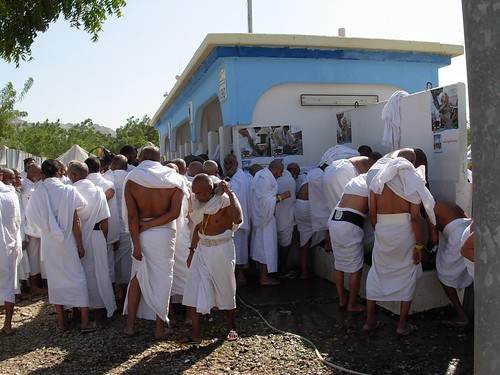
Long queue for use of toilet facilty by male pilgrims at Arafat. Similar situation was there at Mina
The facilities in Makkah were even inferior. Each room was occupied by three, four, five or more persons depending on size. There too the rooms had just the beds. There was no other furniture or any storage facility. Again we had to keep our belongings on the bed or on the floor. Also, bathrooms were common and always dirty. A common problem was that all the toilets in our building were of western style while most of the pilgrims from India were from rural background. It was just impossible for them to use the toilets in the required way. They were climbing on the seat for relieving, resulting in soiling of the seat and discomfort for every one, especially for those who wanted to use the toilet in the desired manner. Quality of the service can be assessed by the fact that we stayed there for about a month. During the entire period not even once the bed sheets were changed.
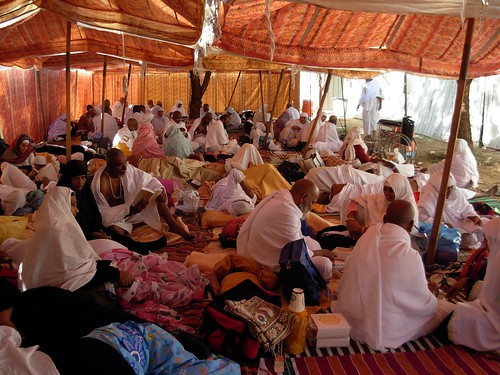
Pilgrims at Arafat: Overcrowding and only a Durrie on the uneven floor
The water meant for use in toilets was being supplied for drinking. When we came to know of that, few of us complained to the AHO in-charge of the building. He informed that he had sent several fax messages to the Main office of the Hajj Committee in Makkah on the issue. But there was no action. I obtained copy of one of the fax messages. I also talked to the officer in-charge for the arrangements in Makkah. But there was no improvement and till the end the practice continued. Many of the pilgrims who did not want to drink the water meant for toilet use were purchasing bottled water during the entire period. We also did the same.
Accommodation not Provided as per the Money Collected
The Hajj Committee of India provides options to the pilgrims to apply for three categories, namely Green, White and Aziziya. Green category included buildings between 0-1000 meters from the outer periphery of Haram Sharif. White category included buildings between 1001-1600 meters from the outer periphery of Haram Sharif. Aziziya was the farthest and attracted minimum rent (Saudi Riyal 1500 per pilgrim). I had applied for the Green category for both of us and we had paid accordingly. But we were put in Azizia in Building No. 650 B. We had to face great difficulty in reaching to Haram Sharif as we had to change bus in between and my wife had problem in walking. For changing the bus we had to walk about half km both ways. We were told by some unconfirmed sources that people who had applied for the last category were accommodated close to Haram i.e. in Green category. It was height of mismanagement.
Inhuman Conditions at Mina and Arafaat etc.
Stay at Mina, Arafaat and Muzdalifah is essential component of Hajj. Pilgrims have to spend about five days at those three places. But those are the most important days for the pilgrims. The facilities provided to the Indian pilgrims at Mina and Arafaat were equally disgusting. In Mina all the pilgrims have to stay in tents. Indian pilgrims had to sleep on floor. About sixty pilgrims were accommodated in each tent in the Indian camps. For each pilgrim there was a quilt like bed which was about six feet long and about only 15 inches wide. A pillow and a thin blanket were also provided. The bed (15 inches wide) was totally insufficient for an average person to sleep. It was impossible to avoid contact with the person on the adjacent bed. The other person could be a male or female as there was no segregation of space for the two sexes and the other person could be Mahram or Namahram. Also, whatever belongings the Indian pilgrims carried, had to be kept on the same (15 inches wide) bed. But that was not the end of the problem.
Toilet facility was almost nonexistent. For example in our camp for several thousand pilgrims there were only ten or twelve toilets, half for males and the rest for females. Obviously there were long queues all the time. Pilgrims had to wait for at least half an hour to find entry into the toilet. For old persons and those having health problems it was extremely difficult. I found people in trouble begging those ahead in the queue to allow them entry. At times they were obliged. But most of the time the same was not possible. After one or two days some of the toilets ceased to work and there was no system of repair or maintenance. I personally went to the office of the Muallim to tell the person in-charge to get the non-functional toilets repaired. But he simply refused. He told that he had no such arrangement. As a result with every passing day the problem got aggravated. I found people literally crying as their garments got soiled on account of the long waiting time.
At Arafaat the conditions were even worse. There, only a ‘shamiana’ type structure was provided to the Indian pilgrims. On the floor there were only rugs (darris) on uneven ground. Pilgrims had to lie down on them. Extreme overcrowding was there. Also, there was no segregation for the pilgrims of two sexes and there was no consideration for Mahram and Namahram. Many pilgrims had to stay in open. Those who could find shades of trees considered themselves to be lucky. Toilet facilities at Arafat were even worse than at Mina. Only about ten toilets were there for several thousand pilgrims from India. There were long queues in front of the toilets all the time. It was taking at least one hour or so for the pilgrims to get opportunity to enter the toilets. Large numbers of pilgrims (including women) had to relieve in the open in full view of the others. Obviously, it was not possible for them to control the urgency for so long. Even for performing “wuzoo” the facilities were totally inadequate. Just five or six taps were there for the entire number of pilgrims. People had to wait for half an hour or so to reach to the tap at peak time, i.e. before the prayers. Regularly, there were bitter arguments between the pilgrims out of frustration. In Arafaat there were no restaurants or other facilities from where food could be procured.
The Muallim was supposed to provide food. The arrangement made by the Muallim was extremely poor. There was just one small kitchen and a very small distribution counter for several thousands of Indian pilgrims. As a result there was heavy rush leading to stampede. I could not at all dare to venture and we had to live on just snacks which we had carried with us. Same was the condition of most of the other pilgrims especially, women and aged persons.
Transportation of pilgrims from our camps in Arafaat to Muzdalifah was the responsibility of the Muallim. We were told that they had arranged forty five buses for the purpose. But we could see only three. As a result there was total stampede when the doors of the buses were opened. We could not enter. Other buses could not be located at all. As a result the pilgrims had no choice except to find some private transport at exorbitant price or to walk. Somehow I could find alternate transport. But most of the people had to walk the entire stretch of about eight or nine km. Even if it is accepted that there were forty five buses the same could not suffice the entire population of pilgrims in our camp running into several thousands. There was no possibility that the buses could come back and make another trip. All the routes on that night are mandatorily one way.
Haphazard Location of Indian Camps at Mina and Consequent Problems
Another problem caused by lack of organization was that in Mina the Indian camps were highly disorganized and haphazard. For example there was one camp for Indian and then there were several other camps and then again one or two camps for Indians. Thus the Indian camps were spread almost in every corner of Mina. Confusion and hardships for the pilgrims were at extreme as the camps were not in serial order. For example, if there was camp no. 34 on a road, the next Indian camp was not 35. It could be anything like 28, 56 or so. Then the next one could be a camp with any serial no. A map was provided to some of the pilgrims indicating locations of the camps. But the map was not such that one could locate the camps easily. More importantly, 95% or more of the pilgrims were from rural areas and totally map-illiterate. In fact I guided two old pilgrims to their camps. They were on the road for more than three hours. Literally they were crying as they were tired and thirsty. I offered to help them. But even for me it took more than one hour to locate their camps. There were some volunteers in Mina to help the pilgrims. But they were of little help as the local volunteers did not understand any other language except Arabic and the Indian volunteers were not well versed with the area and the locations of the camps.
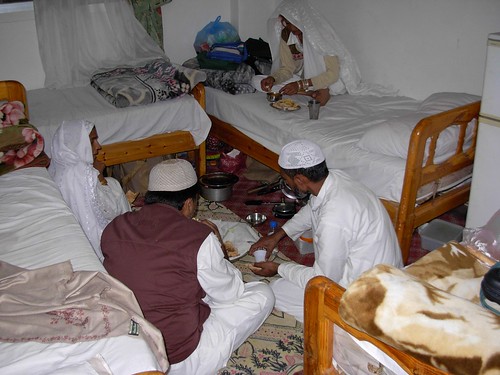
Pilgrims taking lunch in the room huddled on floor or on bed
Facilities for Pilgrims from Other Countries
Incidentally, I had the occasion to visit the places where pilgrims from other countries like Syria, Turkey, Iran, Yemen etc. were accommodated. Also, I had discussions with pilgrims from Afghanistan, Indonesia etc. In all those cases the arrangements were good. There was no overcrowding in the guest houses. Arrangements for food etc. were high class. Even at Mina and Arafat they had comfortable stay. Also, their camps were located in unified manner and proper signage was there to help the pilgrims. I did not find any pilgrim from those countries who were lost in Mina or Arafat and searching for their camps. In Arafat I went inside the Yemen camp and I was surprised to see that the camp was divided into two sections one for men and another for women. There women pilgrims had not to stay intermingled with male pilgrims including those who were Namahram. There was no overcrowding and toilet facilities were more than adequate. There was no queue for toilet or for wuzoo etc. Also, they had proper transport arrangements. For example, when we landed at Medina airport on 16th November, 2008 about ten minutes after our landing a Boeing 747 with Iranian pilgrims landed there. We could see them alighting from the plane. Incidentally, their buses were parked close to us. We found that they boarded the buses immediately, their luggage was loaded within fifteen minutes or so and within half an hour or so of their coming out of the airport their buses had left the airport for the guest house/s.
Another important feature which I observed with pilgrims of other countries was that they left Saudi Arabia as soon as all the rituals related to Hajj were over. In case of Indian pilgrims it is mandatory to spend there abut 45 days. It is likely that some pilgrims like to stay there for so long. But most of the pilgrims with whom I interacted were not in favour of staying for so long. It increases the cost of Hajj as well as the period of inconvenience extends for no reason. But there was no choice available.
Return Journey
We left Makkah on 30th December, 2008 for Jeddah to take flight to Delhi. Again the same mismanagement was there. We were asked to be ready by 4.00 pm and to vacate the rooms and come out of the buildings by that time. All of us complied but we had to wait in the open for hours. We were transported from there only at about 9.00 pm in night. We were taken to another point in small vehicles and put in the bus which was waiting there. Finally, the bus left Makkah only at about 12.00 midnight. So, for about eight hours we had to just wait in open or in the bus.
Journey to Jeddah airport from Makkah is about two hours. But we reached there only at about 5.00 am. Reason was that the driver in our bus had no idea about the route to the airport. He was just changing his route without definite knowledge. At one point he got so confused that he stopped the bus in the middle of the road without any signal. A SUV coming at high speed from behind could not stop and collided with the bus from behind. The bus engine was damaged badly. Probably one of the persons in the SUV died while others were seriously injured. The victims were taken in three ambulances. Luckily, no one from the bus was injured. But the police held the driver. We were stranded on the road and there was no way to reach the airport and we were supposed to report for check in at 5.00 am. On our repeated request the police persons informed the transport company about the accident. After waiting for about an hour another bus arrived and we were transferred to that bus and we could reach the airport. The regular check in was over. But we were allowed to board the flight when we explained about the accident and subsequent events.
Conclusion
Thus the entire experience that we had during the six weeks was totally unexpected and extremely disgusting and horrifying. It was mostly due to mismanagement on the part of the Hajj Committee of India. The accommodations at Medina and Makkah were arranged by the Hajj Committee of India directly. At Mina and Arafaat the arrangements were made by the Muallim. In the absence of effective supervision and control by the Hajj Committee of India they too exploited the situation to the maximum. Indian pilgrims had to suffer every minute of the entire period extending to about 45 days.
There is an urgent need to look into the functioning of the Hajj Committee of India and also there is need to properly supervise the arrangements made for the pilgrims at different places either by the Hajj Committee of India or the Muallim. Otherwise the Indian pilgrims will continue to suffer in coming years too as we did for the entire period of Hajj and will not be able to undertake this ‘once in a lifetime’ religious journey with devotion.
